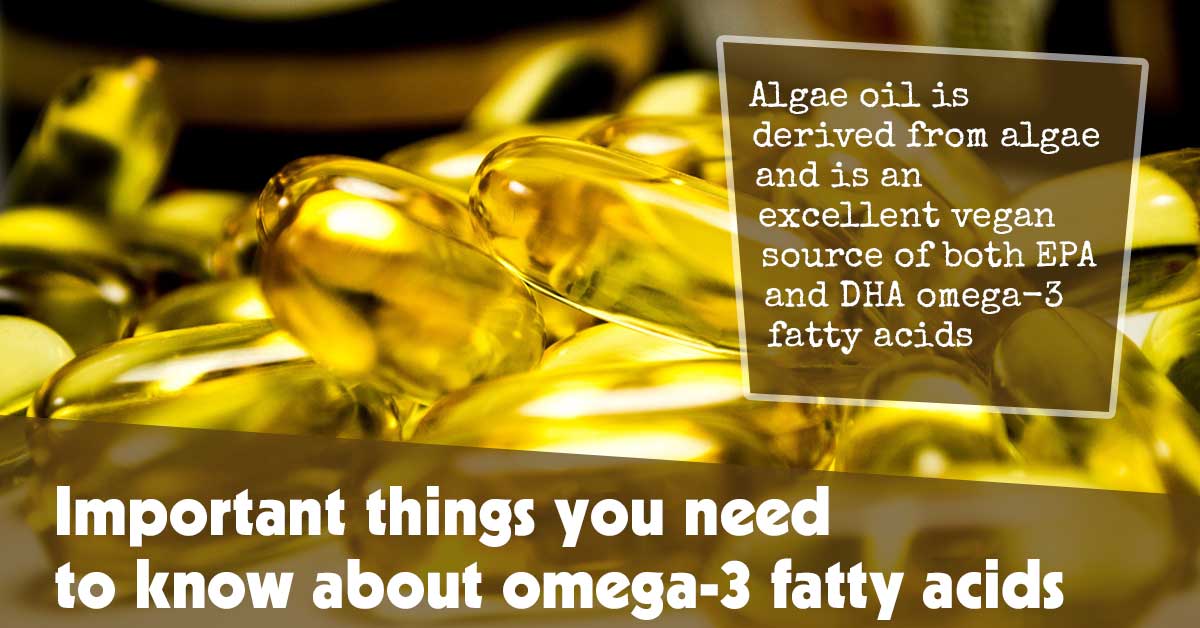What are omega-3 fatty acids?
Essential fatty acids are fatty acids such as omega-3 and omega-6 fatty acids that can’t be produced by the body and so need to be obtained from the diet.
Omega-3 fatty acids are healthy fats generally found in some fish, seeds, and nuts. They are known to have important anti-inflammatory benefits. Omega-6 fatty acids are found in the majority of vegetable oils, eggs, processed foods, and fried foods.
Omega-3 as well as omega-6 fatty acids are essential for a healthy body. Nevertheless, too much omega-6 fatty acid in the diet can have a pro-inflammatory response in the body, so it’s necessary to consume the correct amount.
Omega-3’s affect the cell receptor function in the body’s cell membranes, helping with the regulation of inflammation and blood clotting. Omega-3’s also bind to receptors to regulate genetic function, which can help to protect against some illnesses.
There are 3 main types of omega-3 fatty acids generally seen in Western diets:
1. Eicosapentaenoic acid (EPA)
2. Docosahexaenoic acid (DHA)
3. Alpha-linolenic acid (ALA)
EPA and DHA are most commonly found in fish. ALA is typically found in vegetable oil, nuts, flaxseed, and leafy vegetables.
Omega-3 fatty acid sources
The most popular omega-3 fatty acid sources are fatty fish which include tuna, trout, and salmon, as well as fish oil supplements. This can pose a problem for vegetarians, vegans, or those who have concerns about the risks linked to the consumption of fatty fish.
Plant foods generally contain only the ALA type of fatty acid, and although ALA is essential in the diet, it needs to be first synthesized by the body into the longer-chain omega-3 fatty acids EPA and DHA that are needed for tissue function.1✅ JOURNAL REFERENCE DOI: 10.1016/j.plefa.2006.05.013
Research has however found that less than 0.5% of ALA is converted to DHA, and only 5% is converted to EPA.2✅ JOURNAL REFERENCE DOI: 10.1139/H07-034 There is however a solution for vegans, namely algae oil.
What is algae oil?
Algae oil is derived from algae and is an excellent vegan source of both EPA and DHA omega-3 fatty acids. A study has indicated that algae oil supplements are equivalent to cooked salmon in providing DHA to red blood cells and plasma.3✅ JOURNAL REFERENCE DOI: 10.1016/j.jada.2008.04.020
The researchers compared the DHA availability from algae oil capsules to that from cooked salmon in 32 healthy women and men between the ages of 20 and 65 years.
Throughout the 2-week study, DHA plasma phospholipid levels increased by about 80% and erythrocyte levels by about 25% in both of the groups. Plasma phospholipid and erythrocyte DHA level changes were similar in both groups.
There is no official recommended dose for EPA and DHA. The European Food Safety Authority’s EPA guidelines for adult individuals are between 250 and 500 mg/day.4✅ JOURNAL REFERENCE DOI: 10.2903/j.efsa.2012.2815
The iwi Life algae omega 3 softgel supplement provides a combined EPA and DHA of 250 mg. The algae that iwi life makes use of produces omega-3 in a form that provides 1.7x the rate of absorption of any other omega-3 source.
Omega-3 Essential
iwi life’s algae delivers true Omega-3 DHA and EPA fatty acids with 1.7X the absorption of fish, krill, or even other algae oils. Plus, they have human clinical research to show that their Omega-3s are absorbed by your cells.
Some benefits of omega-3 fatty acids
Omega 3 for eyes
There is a concentration of DHA in the outside areas of the retina of the eye which plays a significant part in vision quality. Reduced levels of DHA are associated with poorer visual function and vision issues may develop if you have a DHA deficiency.5✅ JOURNAL REFERENCE DOI: 10.1159/000448262
A meta-analysis of 21 studies has found that a higher intake of dietary omega-3 has been linked to a reduced risk of developing age-related macular degeneration. Every 15 grams/day of fish consumption was linked to a 13% and 14% reduction in early and late age-related macular degeneration. Fish consumption was also linked to a significantly lower risk of the progression of age-related macular degeneration.6✅ JOURNAL REFERENCE DOI: 10.1016/j.clnu.2021.10.005
Omega 3 and depression
Research has shown an association between omega-3 fatty acid intake and the prevalence of depression. In one study involving 4,150 postmenopausal women, those with the highest consumption of omega-3 fatty acids had significantly less incidence of depression compared to those with the lowest consumption.7✅ JOURNAL REFERENCE DOI: 10.4162/nrp.2021.15.4.468
A meta-analysis of studies has also indicated the efficacy of DHA and EPA supplementation for improving depression symptoms.8✅ JOURNAL REFERENCE DOI: 10.1038/s41398-019-0515-5
Omega 3 and heart disease
The first evidence that omega-3 fatty acids could be beneficial for cardiovascular disease was the discovery that communities that have an omega-3-rich fatty fish diet have lower cardiovascular disease mortality.9✅ JOURNAL REFERENCE DOI: 10.1093/ajcn/87.6.1978S
There is ample evidence from various studies that EPA and DHA supplementation is effective in reducing cardiovascular disease events.10✅ JOURNAL REFERENCE DOI: 10.3390/nu13010204
High triglyceride levels (hypertriglyceridemia) are relatively common in the U.S. Omega-3s are recognized to be a safe and effective option for reducing triglyceride levels.11✅ JOURNAL REFERENCE DOI: 10.1161/CIR.000000000000070912✅ JOURNAL REFERENCE DOI: 10.1016/j.ijcard.2008.03.092
A review of 11 studies found that algae oil supplementation could help improve cardiovascular disease risk factors.13✅ JOURNAL REFERENCE DOI: 10.3945/jn.111.148973
Omega-3 Essential
iwi life’s algae delivers true Omega-3 DHA and EPA fatty acids with 1.7X the absorption of fish, krill, or even other algae oils. Plus, they have human clinical research to show that their Omega-3s are absorbed by your cells.




